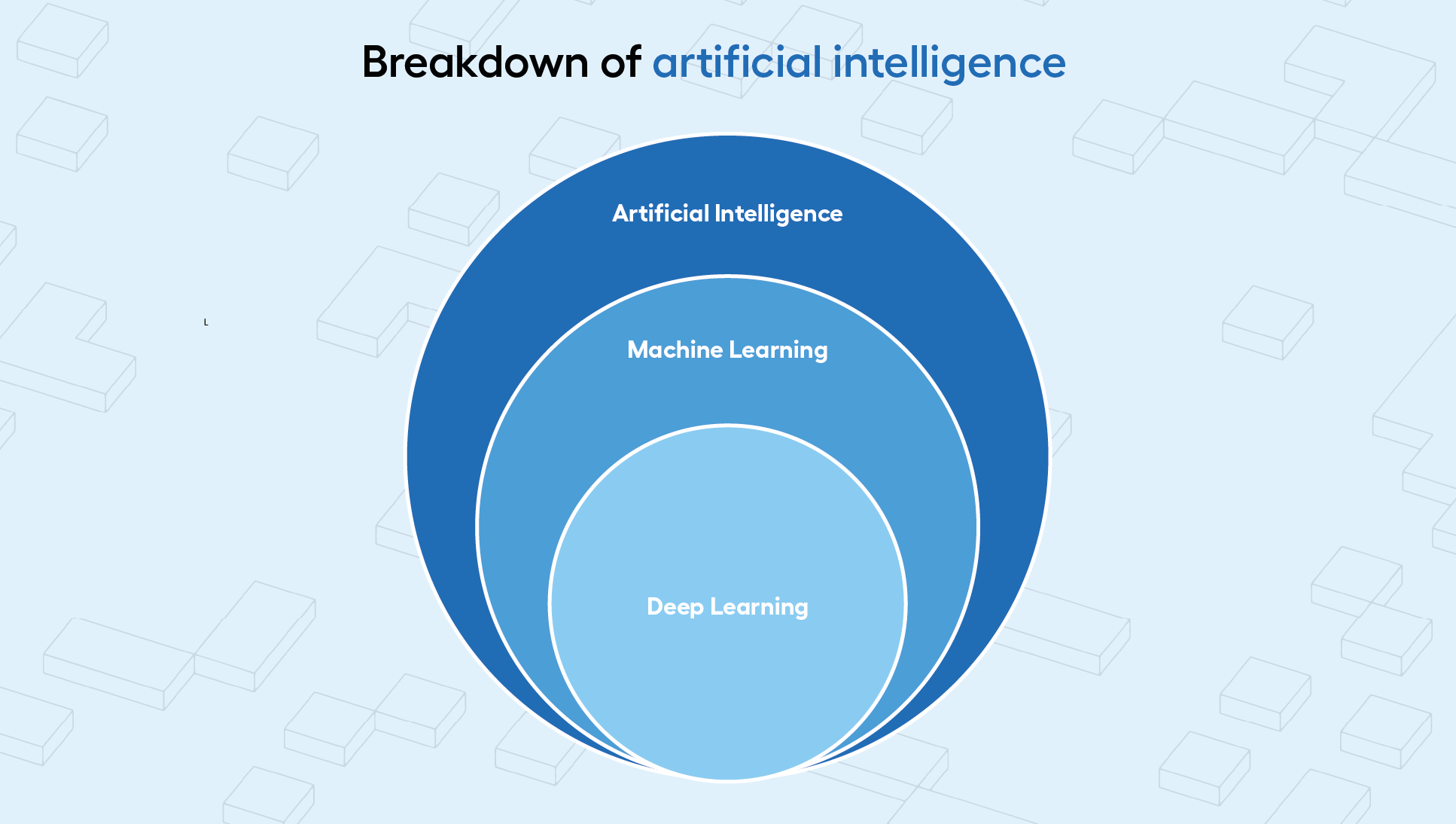Table of contents:
- What is machine learning?
- Machine Learning vs Deep Learning - are they the same?
- Types of machine learning
- How does machine learning work?
- Examples of using machine learning in eCommerce
- Why should you focus on machine learning in your online store?
- The future of machine learning - is machine learning trustworthy?
- Will you embrace machine learning in your eCommerce?
- data classification,
- pattern recognition,
- outcome prediction,
- making informed decisions.
- supervised learning - the algorithm "learns" based on pre-defined human labels and hints (training data), comparing predictions with actual results. For example, in image recognition, an application receives a set of labelled images. Based on this, the algorithm learns to identify patterns and independently predict labels in the future.
- unsupervised learning - in this case, AI receives no assistance. It independently organises data and discovers patterns in the dataset. An example is clustering customers based on their purchases without prior information about preferences.
- semi-supervised learning - This hybrid approach involves training the algorithm using a combination of labelled and unlabeled data. This is common when acquiring fully labelled data is overly complex or costly.
- reinforcement learning - this type of learning resembles trial and error. The AI system operates in a dynamic environment, making decisions and observing consequences. Based on these consequences, it can introduce corrections to enhance the process. Reinforcement learning is commonly used for dynamic pricing or offer personalization.
- big Data processing systems - for storing and processing large amounts of data, e.g., Apache Hadoop or Apache Spark,
- cloud technologies - offering computational resources and services necessary for scalable machine learning operations, e.g., Amazon Web Services or Microsoft Azure,
- natural Language Processing tools - facilitating work with natural language, e.g., Natural Language Toolkit (NLTK).
- precise demand forecasting to optimise inventory management and sales scale control,
- production planning to increase manufacturing line efficiency,
- supporting decision-making processes by identifying key information and potential risks.
- intelligent search engines - predicting purchase intentions, prioritizing previously viewed products in search results,
- chatbots - ssisting in real-time issue resolution based on user website interactions (e.g., guiding a customer searching for a complaint form to a specific page for returns),
- contextual shopping - an innovative approach where customers can buy products directly during activities like watching videos, thanks to machine learning's ability to identify products in multimedia content,
- logistics management tools - they optimise the delivery process, reducing the time it takes to deliver a shipment to a customer. The artificial intelligence-based system can analyse multiple variables, such as current traffic, weather forecasts, product availability in warehouses and customer preferences, to optimise the delivery route.
- cost reduction - implementing machine learning automates many processes, leading to operational cost reduction.
- increased profits - ny optimising processes, personalising offers, and effectively managing prices, machine learning contributes to increased conversions and, consequently, the growth of online store profits.
- reduced error risk - advanced algorithms eliminate the risk of human errors and mistakes in various areas of online store operation.
- improved customer service - gaining relevant customer information contributes to building stronger relationships and increasing customer loyalty.
What is machine learning?
Machine learning (ML) is a subset of artificial intelligence (AI) that focuses on developing computers' ability to learn independently based on provided data (various types like: numerical sequences, spreadsheets, or images). Gained information is then reinforced, processed, and transformed into a format useful for the end-user (e.g., analysis, calculation results, or a chart). Machine learning algorithms are primarily designed for:
It's important to note that machine learning achieves these effects throughout the process, not through a one-time action. The more data the computer receives during the process, the more precise the results will be. This knowledge acquisition process can be compared to human learning, but computers can complete it several times faster.
Machine Learning vs Deep Learning - are they the same?
Artificial Intelligence, Machine Learning, and Deep Learning dominate conversations about new technologies. While these terms are often used alternatively, each has its distinct meaning.
Under the umbrella of Artificial Intelligence lies the general idea of giving computers the ability to think and make decisions based on similarities to the human brain. On the other hand, Machine Learning refers to a specific area of artificial intelligence focusing on developing algorithms and models that enable computers to learn independently based on provided data. Meanwhile, Deep Learning is a specific technique within Machine Learning where complex neural networks are used for information analysis and processing.
The main difference between Machine Learning and Deep Learning lies in the complexity of the models used for information processing. In traditional machine learning, programmers manually select features on which the model relies. In the case of Deep Learning, models can automatically extract features from data, allowing for more advanced information analysis.

Types of machine learning
Depending on the expected results or project complexity, machine learning utilizes various approaches to achieve desired goals. Four key types of Machine Learning include:
How does machine learning work?
Utilising mathematical data models, machine learning employs various technologies that enable computers to learn efficiently without the need for direct instructions. In practice, Python is widely used to create these models due to its versatility, flexibility, transparency, and a rich set of libraries and frameworks that facilitate the development of machine learning applications. Additionally, implementing mathematical models may involve:
These technologies serve as a foundation for effective machine learning project implementation. Depending on the project's complexity or specific requirements, a variety of other technologies within the technological stack (a set of technologies necessary for a given project) may be needed, taking increasingly complex forms.
Examples of using machine learning in eCommerce
The most common way to use Machine Learning in online stores is customising offers to individual customer needs. Analysing purchase data and preferences using recommendation algorithms allows for delivering personalised product suggestions and displaying messages directly tailored to each user. This approach increases the chances of completing transactions. Equally important from this perspective is dynamic pricing, adjusting prices based on market data, competitor prices, and adopted strategies (e.g., setting a minimum product price not lower than the cost plus a specified margin). Continuous monitoring of user activity also helps detect troubling anomalies in behaviour patterns that could indicate potential fraud attempts. Such actions also enhance platform security.
Another area where machine learning plays a crucial role is implementing Enterprise Resource Planning (ERP) systems for efficient enterprise resource management. AI algorithms effectively manage and organise various areas of a company, including:
Machine learning is not only used to improve internal business efficiency but also serves as a valuable tool in shaping consumer shopping experiences. Online stores utilize tools such as:

Why should you focus on machine learning in your online store?
According to McKinsey Insights' analysis, the use of AI tools in commerce is predicted to generate an additional $1.7 trillion in profit. This is just one of many arguments to invest in machine learning in eCommerce. Choosing machine learning solutions for your online store can result in:
Implementing machine learning solutions is a crucial decision that can bring long-term benefits to an online store, making it more competitive, efficient, and adaptable to the dynamic requirements of the modern eCommerce market.
The future of machine learning - is machine learning trustworthy?
"Why did you lie to me?" - it turns out that this question can also be directed at language AI models. There are instances where artificial intelligence algorithms, like ChatGPT or Bard, provide false information, mislead, or create their own narratives. A notable example is an experiment conducted by The New York Times, where editors asked ChatGPT to narrate a meeting between James Joyce and Vladimir Lenin. The robot accurately described the details of the event, which never actually occurred. How is this possible?
These situations, where AI systems generate untrue information, are referred to as "AI hallucinations." This phenomenon occurs when AI produces results inconsistent with any patterns or data on which it was trained. Currently, it's challenging to pinpoint the cause of this problem, as it may be linked to misinterpreting questions, improper training, or a lack of contextualization abilities. It is also uncertain whether completely eliminating this phenomenon will be possible in the future. One thing is certain: as per the definition, the quality of machine learning results will increase with the quantity of provided data. Therefore, it's essential to use AI tools with human oversight and verification. This ensures the benefits of artificial intelligence are reaped while avoiding excessive automation, which can lead to generating misleading information and errors, complicating business management paradoxically.
Will you embrace machine learning in your eCommerce?
Machine learning models are absorbing increasing amounts of data, continually improving their skills. Thus, they undoubtedly constitute a crucial element of the future of eCommerce. Machine learning allows for efficient personalization of offers (thus improving shopping experiences) and effective optimization of processes and online store management. The added value of machine learning is evident in both external (customer-directed) and internal (related to online business management) improvements. Everything indicates that the decision to implement machine learning in your e-store should be a positive one. However, if you have any questions or doubts, we are happy to address them!



